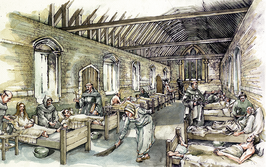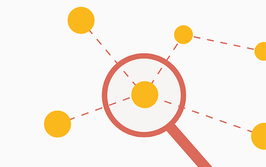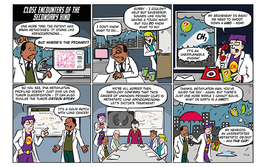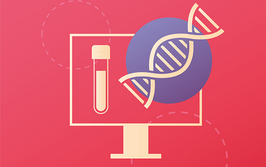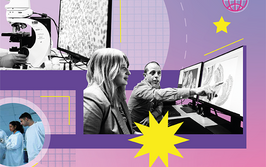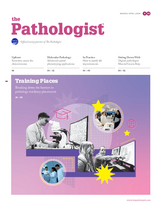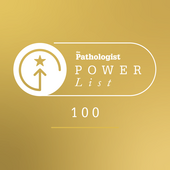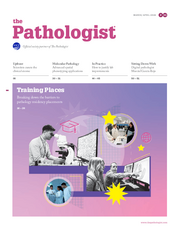
The Patient Expert
Pathologists, patients and primary care providers need to communicate openly and enthusiastically with one another
My story
As a patient with a rare and incurable disease and a cornucopia of comorbidities, I quickly understood the advantages of learning more about my health issues. I am part of a culture where “discussion and dialog” are considered essential to everyday life, so I knew right from the start that my health care providers would play a huge role in my quest to acquire more knowledge – and that includes the pathologists and laboratory medicine professionals who diagnosed me, and who continue to monitor my health and make sure that my medications are doing their job. I know that I need to educate myself so that I can be an equal partner in discussions about my future treatments and health management. If I want shared decision-making, I had better up my game!
Getting to know pathology
Before I became a patient (and still in the pre-CSI era), I was only aware of the “pop culture” presentation of pathologists – that they were the doctors who performed autopsies and investigated unexplained deaths. It was only after I became a regular “customer” of the healthcare system that my view expanded.
Patients with autoimmune liver diseases, such as mine, often experience inflammatory bowel symptoms, so when my hospital hosted a patients’ open day on the subject, I decided to attend – and I am so glad I did, because it was my first real introduction to pathology. I walked through a huge, inflatable “gut tunnel” to enter the exhibit, and when I emerged, I saw a lady standing in a corner with a microscope, a television screen, and a big bucket of slides.
It was a wonderful way to discover pathology, because that particular pathologist was so enthusiastic about her work that she got everyone else excited as well. She showed us slides of various body parts and disease processes, explaining which parts of the intestine were affected by certain disorders and why. When I told her that my problems were rooted in the liver, she pulled out slides of the liver and began to show them to me, explaining the different colors in the images and what the findings meant in terms of my disease.
The rights and the wrongs
All of my medical care is handled through my primary care physician – and I’m happy with that, because he is excellent. He looks at all of my reports, including those from pathology, and translates all of that information into language I understand. I don’t feel the need to have one-on-one meetings with my pathologists because they are so good at providing comprehensive information to my doctor, and because my doctor is so good at presenting that information to me.
I consider open communication between patients and physicians absolutely essential. Not all doctors are equally comfortable speaking to patients – and certainly, not all are equally skilled – but both parties are vital to the equation and should be treated as equals. In some instances, pathologists might prefer to relay information to a central contact point (for instance, a primary care provider); in others, they might prefer to speak directly to the patients themselves, rather than go through a middleman. In my opinion, the precise form the communication takes is not nearly as important as the fact that it takes place at all. Doctors should be open to speaking with their patients, and patients should never hesitate to ask questions.
In December of 2016, I co-organized the “Rare Liver Disease Dialog” in the Netherlands, a concept developed by patients and researchers together. During the half-day event, researchers, clinicians and patients from the rare liver disease community met and exchanged ideas. It was a unique opportunity for patients to learn more about both science basics and the ongoing research in their field, and an equally interesting chance for researchers to actually – finally! – interact with the target audience for whom their research aims to make a difference. Topics included unmet needs, why some kinds of research are more difficult than others, and a simple – yet surprising to researchers – request from a patient: could they make their surveys shorter due to disease-related difficulty concentrating? That day, I really feel like we patients were able to put a face to the research in our community – and with the wonderful side effect of mutual understanding.
The patients’-eye view
As a patient, I want pathologists – and, in fact, all doctors – to know that we truly appreciate their sharing information with us. It helps us to visualize our diseases and understand what’s going on inside our own bodies. The more friendly and approachable a medical expert is, and the more information they provide (whether in reports, patient interactions, or educational settings), the more empowered we feel to learn about and manage our own health. As we say in the Netherlands, it’s great to have a “peek in the kitchen” to see the secret recipe of our medical care. We really appreciate it when you speak to us! And listening to us, too, might help you to find the missing piece of a medical puzzle…
Of course, not every doctor has the time to interact with every patient – nor is it always necessary. I think there is a lot of merit in community events like the open day where I first encountered a pathologist face-to-face. Any pathologist or “behind the scenes” professional should definitely consider participating in and promoting such an event if they get the chance. However it’s accomplished, the key is for professionals to bring their knowledge to the patients and treat them like equals in their own health care.
At the same time, I am a big believer in patients’ educating themselves. I think patients should always get involved with their medical care teams – asking questions, studying their medical records, researching and reading as much as possible about their own health issues – and, of course, talking to their doctors about anything they need. The doctor may be the medical expert, but we patients are the experts on our own bodies and symptoms and preferences, and we often have information to share that isn’t enshrined in the official medical textbooks. The digestive symptoms I mentioned earlier are one example; they are not all formally considered symptoms of autoimmune liver disease, but most of the liver disease patients I know experience them. If I want my doctor to know that I am uncomfortable and want to explore treatment options for my possible inflammatory bowel, I need to speak up – and my doctor needs to listen! We can only make great progress if we all work together: physicians, pathologists, and patients.
Marleen Kaatee is the founding President of PSC Patients Europe and a fellow of the EUPATI Patient Expert Training Course.

